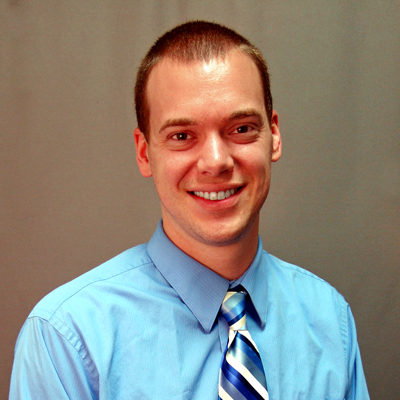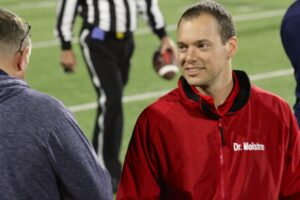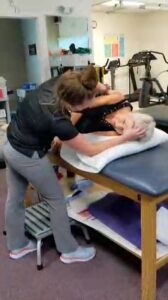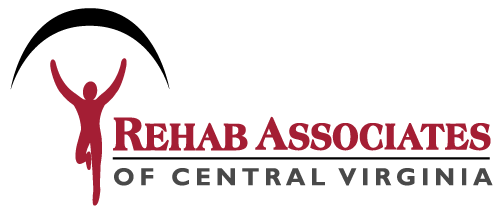
By Jordan Molstre, PT, DPT
Concussions aren’t just for kids. In fact, though often associated with young athletes participating in contact sports, concussions pose a significant concern for our elderly population. As people age, the consequences of concussions can become more severe, leading to health complications and eventually to diminished quality of life. Plus, the symptoms of concussions are often confused with signs of normal aging. As a result, concussions in the elderly often go untreated or undertreated.
What is a Concussion?

Concussions are often thought to be the result of sports injuries, but concussions in the elderly are often the result of a simple fall.
A concussion is a traumatic brain injury that causes the head and brain to move in ways that creates a disruption to the brain cells and nerves. The injury causes chemical changes to the brain that lead to a wide range of symptoms. To put it simply, a concussion is an injury to the brain that causes a change in the way a person thinks or feels. No two concussions are exactly the same. For example, person A may lose consciousness, while person B does not. In fact, two people suffering from a concussion could experience entirely different symptoms.
What Causes a Concussion?
Concussions can be caused by a direct blow to the head, face, neck, or body. In our elderly population, a concussion is often caused by an automobile accident or, most often, a simple fall. In the case of a fall, just as you check for broken bones and bruises afterwards, it is important to assess for signs of a concussion.
What are Signs of a Concussion?
Assessing and diagnosing a concussion in our elder population becomes difficult when some symptoms are considered to be part of normal aging. For this reason, symptoms of a concussion must be taken seriously and evaluated by a healthcare professional. Some of the changes a person may experience following a concussion include: memory problems, difficulty concentrating, anxiety, depression or mood swings. Other symptoms include dizziness, headaches, blurred vision, fatigue or low energy, nausea or vomiting, sensitivity to light or noise, balance issues, or sleep problems.

Dr. Cate Lowe treats concussions and vertigo at our Clifton clinic.
How Can a Physical Therapist Provide Concussion Management?
Physical therapists work with patients to restore balance, increase strength, prevent falls, and to recover from concussions. At Rehab Associates, we evaluate symptoms and utilize tools like manual therapy, stability and balance exercises, and mental challenges to move people toward recovery and allow the return to normal activities.
Our concern for elderly patients is their comorbidities can lead to a slower recovery. So, when someone older begins to experience these signs, please investigate the possibility of a concussion right away. The quicker we recognize the physical and emotional changes as a sign of concussion, the quicker we can help the person return to their normal activities of daily living.
Overall, rest is crucial to recovery to give the brain time to heal. Slowly resuming activities with careful monitoring of the symptoms is also key to complete recovery. Physical and cognitive therapy will go a long way to helping those with concussions recover.
What are Some Proactive Measures that Can Be Taken?
The most important step anyone can take is to minimize the possibility of falls. Install grab bars in bathrooms, remove tripping hazards, add lighting in darker areas of the home like hallways, and remove throw rugs. Regular exercise to improve strength and balance is important as well. A physical therapist can provide education and training to ensure that the exercise routine is well-planned and suited appropriately for age and strength. Once a fall has occurred, evaluate completely, not just for broken bones and bruises, but for the signs of a concussion.
Is Dizziness a Sign of a Concussion?
Dizziness is one of the most common complaints in older adults and can have many causes. Sometimes, dizziness presents like a spinning sensation, which is often diagnosed as benign paroxysmal positional vertigo (BPPV). BPPV is when the otolith (crystals) in the inner ear becomedislodged and travel to the semicircular canals, the portion of the inner ear responsible for helping us stay balanced; they disrupt our sense of balance. Then, the room seems to be spinning. The good news is that BPPV can be resolved with physical therapy. At Rehab Associates, we have many very skilled therapists who can treat BPPV quickly and expertly.
Conclusion
Concussions in older adults are serious health issues and require increased awareness and quality treatment to help symptoms resolve and to keep issues from arising down the road. By evaluating for concussions as opposed to brushing over symptoms as normal signs of aging, we can better protect the elderly population, ensuring they receive the care they need to live a happier and healthier life.
About the author: Dr. Jordan Molstre is a site director and physical therapist at the Rehab Associates Forest Brook clinic in Lynchburg, Virginia. He is certified in vestibular rehabilitation and concussion management. For more information about concussions and the physical therapists who treat this health concern at Rehab Associates, please visit https://racva.com/concussion/.
